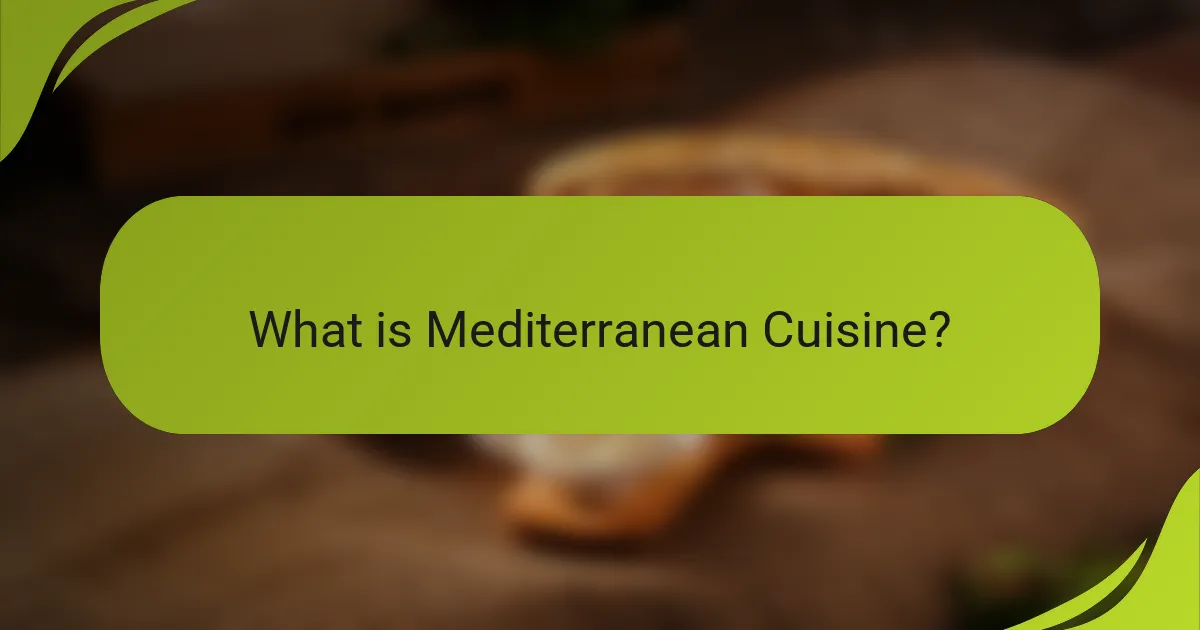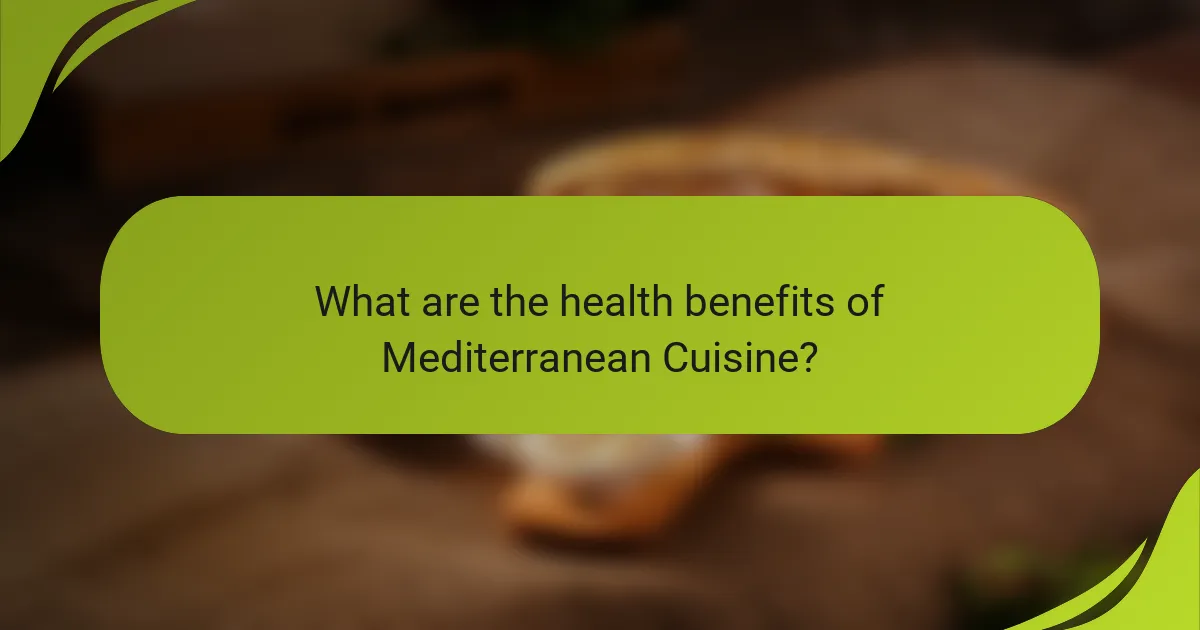Mediterranean cuisine is a culinary style that originates from countries bordering the Mediterranean Sea, characterized by the use of fresh, seasonal ingredients such as fruits, vegetables, whole grains, legumes, and healthy fats like olive oil. This cuisine is known for its health benefits, including lower rates of heart disease, obesity, and improved cognitive function, supported by various studies. Key ingredients include olive oil, tomatoes, garlic, and fresh herbs, which reflect the region’s agricultural practices. Common cooking methods such as grilling, roasting, and sautéing emphasize the use of fresh ingredients while promoting a sustainable approach to food. Overall, Mediterranean cuisine offers a diverse array of dishes that contribute to longevity and overall well-being.

What is Mediterranean Cuisine?
Mediterranean cuisine is a culinary style originating from countries bordering the Mediterranean Sea. It emphasizes fresh, seasonal ingredients such as fruits, vegetables, whole grains, legumes, and healthy fats like olive oil. This cuisine includes a variety of dishes that showcase local flavors and cooking techniques. Common ingredients include garlic, herbs, fish, and lean meats. Mediterranean cuisine is known for its health benefits, which are supported by research indicating lower rates of heart disease and obesity in Mediterranean countries. The Mediterranean diet is often praised for promoting longevity and overall well-being.
How is Mediterranean Cuisine defined?
Mediterranean cuisine is defined as a culinary tradition originating from countries bordering the Mediterranean Sea. It emphasizes fresh, seasonal ingredients, including fruits, vegetables, grains, legumes, and healthy fats like olive oil. Seafood is commonly featured, reflecting the region’s maritime culture. This cuisine is also known for its use of herbs and spices, enhancing flavor without relying on excessive salt. The dietary patterns often include moderate consumption of dairy, particularly yogurt and cheese. Historical influences from various cultures have shaped Mediterranean cuisine, making it diverse yet cohesive. Studies show that this diet is associated with numerous health benefits, including reduced risk of heart disease and improved longevity.
What regions are included in Mediterranean Cuisine?
Mediterranean cuisine includes regions such as Southern Europe, North Africa, and the Levant. Specifically, it encompasses countries like Italy, Greece, Spain, Turkey, Morocco, and Lebanon. These areas share common agricultural practices, climate, and cultural influences. The Mediterranean Sea influences the availability of ingredients in these regions. Olive oil, fresh vegetables, and seafood are staples in Mediterranean diets. Historical trade routes also contributed to the exchange of culinary traditions. The Mediterranean diet is recognized for its health benefits, including reduced risk of chronic diseases.
What historical influences shape Mediterranean Cuisine?
Mediterranean cuisine is shaped by various historical influences including trade, conquests, and cultural exchanges. The ancient Greeks and Romans introduced ingredients like olives and grapes. The spread of [censured] in the 7th century brought spices and new cooking techniques. The Ottoman Empire contributed diverse flavors and dishes across the region. Trade routes facilitated the exchange of food products, enhancing culinary diversity. Each historical period left a mark on the ingredients and cooking methods used today. This rich tapestry of influences creates the unique character of Mediterranean cuisine.
What are the core principles of Mediterranean Cuisine?
The core principles of Mediterranean cuisine include the use of fresh, seasonal ingredients. This cuisine emphasizes fruits, vegetables, whole grains, legumes, and nuts. Olive oil is the primary fat used, known for its health benefits. Fish and poultry are preferred over red meat. Meals are often enjoyed with family and friends, promoting social interaction. Herbs and spices enhance flavor without relying on salt. Fermented foods, like yogurt, are common for digestive health. Finally, moderation in portion sizes is a key aspect of this dietary approach.
How does the Mediterranean Diet differ from other diets?
The Mediterranean Diet differs from other diets primarily in its emphasis on whole foods, healthy fats, and plant-based ingredients. It prioritizes the consumption of fruits, vegetables, whole grains, legumes, nuts, and olive oil. Unlike many diets that may restrict certain food groups, the Mediterranean Diet encourages a balanced intake of various food types.
This diet also includes moderate consumption of fish and poultry, while limiting red meat and processed foods. Research shows that the Mediterranean Diet is associated with lower risks of heart disease and improved longevity. A study published in the New England Journal of Medicine found that participants following this diet experienced significant cardiovascular benefits compared to those on a low-fat diet.
Overall, the Mediterranean Diet promotes a sustainable and enjoyable approach to eating, contrasting with more restrictive diets that may focus on calorie counting or elimination of food groups.
What are the foundational ingredients of Mediterranean Cuisine?
The foundational ingredients of Mediterranean cuisine include olive oil, vegetables, whole grains, legumes, fish, and herbs. Olive oil serves as the primary fat source, known for its health benefits. Fresh vegetables such as tomatoes, peppers, and eggplants are staples in many dishes. Whole grains like bread and pasta provide essential carbohydrates. Legumes, including chickpeas and lentils, are rich in protein and fiber. Fish, particularly fatty varieties like salmon, contribute omega-3 fatty acids. Herbs such as basil, oregano, and parsley enhance flavor and nutritional value. These ingredients reflect the region’s agricultural practices and dietary traditions.

What are the health benefits of Mediterranean Cuisine?
Mediterranean cuisine offers numerous health benefits. It is rich in healthy fats, primarily from olive oil, which can lower heart disease risk. This cuisine includes a variety of fruits, vegetables, whole grains, and legumes. These foods provide essential vitamins, minerals, and antioxidants. Studies show that Mediterranean diets can improve cognitive function and reduce the risk of Alzheimer’s disease. The diet is also associated with lower rates of obesity and type 2 diabetes. Research published in the New England Journal of Medicine found that participants following a Mediterranean diet had a 30% lower risk of cardiovascular events. Additionally, it promotes a balanced intake of nutrients, contributing to overall wellness.
How does Mediterranean Cuisine contribute to overall health?
Mediterranean cuisine contributes to overall health through its emphasis on whole foods and healthy fats. This diet includes fruits, vegetables, whole grains, nuts, and olive oil. It is rich in antioxidants and fiber, which support heart health. Studies show that Mediterranean diets lower the risk of cardiovascular diseases. Research published in the New England Journal of Medicine found that this diet reduces the incidence of heart attacks and strokes. Additionally, Mediterranean cuisine is linked to improved cognitive function and reduced risk of Alzheimer’s disease. The combination of these elements promotes longevity and overall well-being.
What specific health benefits are associated with the Mediterranean Diet?
The Mediterranean Diet offers several specific health benefits. It is linked to reduced risk of heart disease. Studies show it can lower cholesterol levels and improve blood pressure. The diet is also associated with weight management. Research indicates it aids in maintaining a healthy weight. Additionally, it may enhance brain health. Evidence suggests it reduces the risk of cognitive decline and Alzheimer’s disease. The Mediterranean Diet is rich in antioxidants. This helps combat inflammation and oxidative stress. Overall, its emphasis on whole foods contributes to overall longevity and well-being.
How does Mediterranean Cuisine impact heart health?
Mediterranean cuisine positively impacts heart health. It emphasizes whole foods like fruits, vegetables, whole grains, and healthy fats. These foods are rich in antioxidants, fiber, and omega-3 fatty acids. Studies show that following a Mediterranean diet reduces the risk of cardiovascular diseases. For instance, a study published in the New England Journal of Medicine found a 30% reduction in heart disease risk among participants adhering to this diet. Additionally, the use of olive oil, a staple in Mediterranean cooking, has been linked to lower cholesterol levels and improved heart function. Overall, the diet’s balanced approach supports overall cardiovascular health.
Why is Mediterranean Cuisine recommended for weight management?
Mediterranean cuisine is recommended for weight management due to its emphasis on whole foods and healthy fats. This diet includes fruits, vegetables, whole grains, and lean proteins. It encourages the consumption of olive oil as a primary fat source, which is rich in monounsaturated fats. Studies indicate that this type of dietary fat can promote satiety and reduce overall calorie intake. Additionally, Mediterranean cuisine is low in processed foods and added sugars. Research shows that adherence to this diet can lead to effective weight loss and improved metabolic health. A study published in the New England Journal of Medicine found that participants following a Mediterranean diet lost more weight compared to those on a low-fat diet. Therefore, Mediterranean cuisine supports sustainable weight management through its balanced and nutritious food choices.
What role do portion sizes play in Mediterranean eating habits?
Portion sizes in Mediterranean eating habits emphasize moderation and balance. This approach encourages smaller servings of diverse foods. It promotes the enjoyment of meals without overeating. Research indicates that smaller portions contribute to better weight management. A study published in the journal “Nutrition Reviews” highlights that Mediterranean diets often include shared dishes. This encourages mindful eating and social interaction during meals. Additionally, traditional Mediterranean meals focus on vegetables, whole grains, and healthy fats in reasonable amounts. This balance helps maintain nutritional adequacy while preventing excessive caloric intake.
How do the ingredients in Mediterranean Cuisine support weight loss?
Ingredients in Mediterranean Cuisine support weight loss through their nutrient density and healthy fats. Foods like olive oil, nuts, and fish provide essential fatty acids. These fats promote satiety, reducing overall calorie intake. Vegetables and whole grains are high in fiber, aiding digestion and prolonging feelings of fullness. Research shows that a Mediterranean diet can lead to significant weight loss. A study published in the New England Journal of Medicine found that participants on this diet lost more weight than those on low-fat diets. The inclusion of lean proteins from legumes and fish helps maintain muscle mass during weight loss. Overall, the balanced composition of ingredients in Mediterranean Cuisine fosters a sustainable approach to weight management.

What are the common ingredients in Mediterranean Cuisine?
Common ingredients in Mediterranean cuisine include olive oil, tomatoes, garlic, and herbs. Olive oil serves as a primary fat source, known for its health benefits. Tomatoes are often used fresh or in sauces, contributing to flavor and nutrition. Garlic adds depth to dishes and is valued for its health properties. Fresh herbs like basil, oregano, and parsley enhance the taste of various meals. Additionally, legumes such as chickpeas and lentils are staple protein sources. Whole grains, particularly wheat and barley, are frequently used in breads and salads. These ingredients reflect the region’s agricultural practices and dietary traditions.
What staples are found in Mediterranean kitchens?
Staples found in Mediterranean kitchens include olive oil, fresh vegetables, legumes, and whole grains. Olive oil is a primary fat source, known for its health benefits. Fresh vegetables like tomatoes, peppers, and eggplants are commonly used. Legumes such as chickpeas and lentils provide protein and fiber. Whole grains, including bread and pasta, are dietary staples. Herbs and spices like oregano and basil enhance flavor in Mediterranean dishes. These ingredients reflect the region’s emphasis on plant-based foods and healthy fats.
How do olive oil and herbs enhance Mediterranean dishes?
Olive oil and herbs significantly enhance Mediterranean dishes by adding flavor and health benefits. Olive oil serves as a primary fat source, providing richness and a distinct taste. It contains monounsaturated fats, which are beneficial for heart health. Herbs, such as basil, oregano, and rosemary, contribute aromatic flavors and antioxidants. These herbs also have anti-inflammatory properties, which can improve overall health. The combination of olive oil and herbs creates a balanced flavor profile, elevating the taste of vegetables, meats, and grains in Mediterranean cuisine. Studies show that Mediterranean diets rich in these ingredients are associated with lower risks of chronic diseases.
What role do fruits and vegetables play in Mediterranean meals?
Fruits and vegetables are central to Mediterranean meals. They provide essential nutrients and dietary fiber. Mediterranean diets typically emphasize plant-based foods. This includes a wide variety of fruits and vegetables. Studies show that these foods contribute to lower rates of chronic diseases. For example, the Mediterranean diet is linked to reduced heart disease risk. Fruits and vegetables also enhance flavor and variety in meals. They are often used in salads, stews, and side dishes. Their inclusion supports overall health and well-being.
What proteins are commonly used in Mediterranean Cuisine?
Common proteins used in Mediterranean cuisine include fish, chicken, lamb, and legumes. Fish is a staple due to its health benefits and abundance in coastal regions. Chicken is versatile and often grilled or roasted. Lamb is favored for its rich flavor and is commonly used in dishes like kebabs. Legumes, such as chickpeas and lentils, provide plant-based protein and are essential in dishes like hummus and stews. These proteins contribute to the Mediterranean diet’s emphasis on healthy eating and balanced nutrition.
How do seafood and legumes contribute to Mediterranean diets?
Seafood and legumes are essential components of Mediterranean diets. Seafood provides high-quality protein and omega-3 fatty acids. These nutrients support heart health and reduce inflammation. Legumes, such as lentils and chickpeas, are rich in fiber and plant-based protein. They contribute to satiety and help maintain stable blood sugar levels. Both food groups are low in saturated fats, promoting overall health. The Mediterranean diet emphasizes the consumption of these foods for their nutritional benefits and sustainability. Studies show that incorporating seafood and legumes can lower the risk of chronic diseases.
What are the benefits of using lean meats in Mediterranean cooking?
Lean meats in Mediterranean cooking provide numerous health benefits. They are lower in saturated fat compared to fatty meats. This can help reduce the risk of heart disease. Lean meats are also a great source of high-quality protein. Protein is essential for muscle repair and growth. Additionally, they contain important nutrients like iron and zinc. These nutrients support immune function and overall health. Incorporating lean meats aligns with the Mediterranean diet’s emphasis on balanced nutrition. Studies show that this diet can lead to improved cardiovascular health and longevity.

What cooking styles are prevalent in Mediterranean Cuisine?
Mediterranean cuisine features several prevalent cooking styles. These include grilling, roasting, and sautéing. Grilling is popular due to its ability to enhance flavors while using minimal fat. Roasting brings out the natural sweetness of vegetables and meats. Sautéing allows for quick cooking while retaining nutrients. Each of these methods emphasizes fresh ingredients and healthy fats, such as olive oil. The use of herbs and spices is also common, adding depth to the dishes. Mediterranean cooking often focuses on seasonal and local produce, promoting a sustainable approach to food.
How do different cooking methods influence Mediterranean dishes?
Different cooking methods significantly influence Mediterranean dishes. Techniques such as grilling, steaming, and sautéing enhance flavors while preserving nutrients. Grilling imparts a smoky flavor and reduces the need for added fats. Steaming maintains the freshness of vegetables, ensuring essential vitamins remain intact. Sautéing allows for quick cooking at high heat, intensifying flavors without overcooking ingredients. Each method contributes to the overall health benefits associated with Mediterranean cuisine. For example, studies indicate that grilled vegetables retain more antioxidants compared to boiled ones. The choice of cooking method directly impacts the taste, texture, and nutritional profile of the dishes.
What are the benefits of grilling and roasting in Mediterranean cooking?
Grilling and roasting in Mediterranean cooking enhance flavor and preserve nutrients. These methods create a smoky, charred taste that complements the natural flavors of ingredients. Roasting vegetables caramelizes their sugars, resulting in a sweeter profile. Both techniques require minimal added fats, promoting healthier meals. Grilling meats can reduce fat content while maintaining moisture. Mediterranean diets emphasize fresh, seasonal produce, making these cooking styles ideal for showcasing quality ingredients. Research indicates that grilling can retain more vitamins compared to boiling. Overall, grilling and roasting align with the Mediterranean focus on healthful eating.
How does sautéing enhance the flavors of Mediterranean ingredients?
Sautéing enhances the flavors of Mediterranean ingredients by concentrating their natural tastes. The high heat of sautéing caramelizes sugars in vegetables and proteins. This process produces a rich, complex flavor profile. Ingredients like garlic, onions, and herbs release essential oils when sautéed. These oils contribute to the aromatic quality of Mediterranean dishes. Additionally, sautéing helps to retain the nutrients in vegetables. A study published in the Journal of Agricultural and Food Chemistry indicates that sautéing can preserve antioxidants in vegetables. This method also allows for the layering of flavors through the addition of spices and seasonings. Overall, sautéing is a key technique that maximizes the flavor potential of Mediterranean ingredients.
What traditional cooking techniques are used in Mediterranean Cuisine?
Traditional cooking techniques used in Mediterranean cuisine include grilling, roasting, and sautéing. Grilling is common for meats and vegetables, enhancing flavors through direct heat. Roasting allows for caramelization, bringing out natural sweetness in ingredients. Sautéing involves cooking food quickly in a small amount of oil, preserving texture and taste. Stewing is also prevalent, combining ingredients slowly to develop rich flavors. These techniques emphasize fresh ingredients and healthy preparation methods, aligning with the Mediterranean diet principles.
How does slow cooking affect the taste and texture of Mediterranean meals?
Slow cooking enhances the taste and texture of Mediterranean meals by allowing flavors to meld and develop over time. This method tenderizes meats and softens vegetables, resulting in a harmonious blend of tastes. Ingredients like tomatoes, herbs, and spices release their essential oils and flavors, creating a rich sauce. Additionally, slow cooking preserves moisture, leading to juicy and flavorful dishes. Studies show that cooking at lower temperatures for extended periods can enhance the bioavailability of nutrients, making the meals not only tastier but also healthier. This technique is key in traditional Mediterranean dishes like stews and braises, where depth of flavor is crucial.
What is the significance of communal cooking in Mediterranean culture?
Communal cooking is significant in Mediterranean culture as it fosters social bonds and cultural identity. This practice brings families and communities together, encouraging shared experiences and collaboration. Traditional recipes are often passed down through generations during these gatherings. The act of cooking together enhances the appreciation of local ingredients and culinary traditions. Additionally, communal meals promote the Mediterranean diet, which emphasizes health benefits through the consumption of fresh produce and healthy fats. This cultural practice is rooted in historical customs where communal cooking was essential for survival and community cohesion. Overall, it plays a vital role in preserving culinary heritage and promoting social interaction.
What are some practical tips for incorporating Mediterranean Cuisine into daily meals?
Incorporating Mediterranean cuisine into daily meals can be achieved through simple strategies. Start by including more fruits and vegetables in your diet. Aim for at least five servings of a variety of colorful produce each day. Use whole grains like quinoa, brown rice, and whole wheat pasta as staples. Incorporate healthy fats such as olive oil, nuts, and avocados for cooking and dressings.
Add legumes like chickpeas and lentils for protein and fiber. Choose fish as a primary protein source at least twice a week. Opt for herbs and spices instead of salt for flavor enhancement. Finally, practice mindful eating by enjoying meals with family and friends, which is a key aspect of Mediterranean culture. These tips align with dietary patterns associated with lower rates of chronic diseases.
Mediterranean cuisine is a culinary tradition originating from countries bordering the Mediterranean Sea, characterized by fresh, seasonal ingredients such as fruits, vegetables, whole grains, legumes, and healthy fats like olive oil. This cuisine is associated with numerous health benefits, including lower risks of heart disease and obesity, and emphasizes cooking styles like grilling, roasting, and sautéing. Key ingredients include olive oil, seafood, lean meats, and a variety of herbs and spices, reflecting the region’s agricultural practices. The article explores the core principles, historical influences, common ingredients, and health advantages of Mediterranean cuisine, providing practical tips for incorporating these dietary patterns into daily meals.